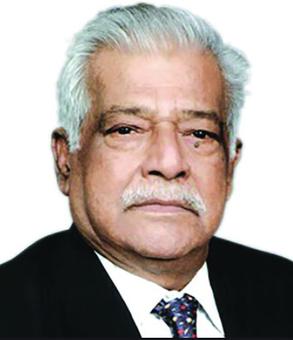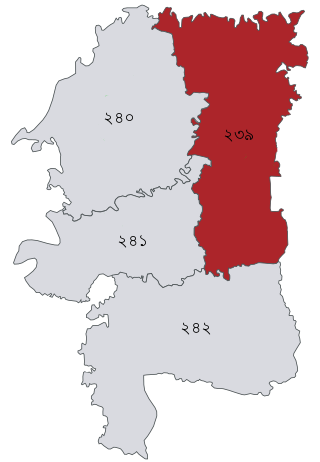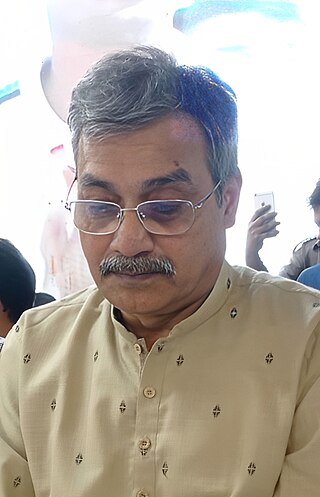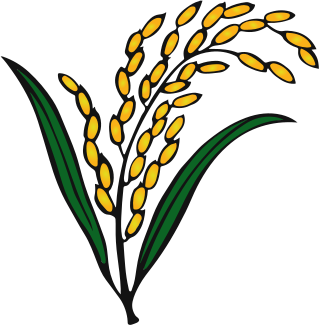| ||
Elections in Bangladesh in 2018 include election to the office of the President of Bangladesh, 11th Jatiya Sangsad election, by-elections to the 10th Jatiya Sangsad, elections to several city corporations, municipalities and local bodies.
| ||
Elections in Bangladesh in 2018 include election to the office of the President of Bangladesh, 11th Jatiya Sangsad election, by-elections to the 10th Jatiya Sangsad, elections to several city corporations, municipalities and local bodies.
Presidential election was held on 7 February 2018. [1] Incumbent President Mohammad Abdul Hamid was nominated for the second time as the candidate to run for election by the ruling party. [2] Hamid was declared president by the Election Commission as no other candidate submitted nomination papers to the commission. [3]
| Date | President before election | Party before election | Elected President | Party after election | Ref. | ||
|---|---|---|---|---|---|---|---|
| 7 February 2018 [lower-alpha 1] | Mohammad Abdul Hamid | Bangladesh Awami League | Mohammad Abdul Hamid | Bangladesh Awami League | [4] [5] | ||
General elections were held in Bangladesh on 30 December 2018 to elect 300 directly elected members of the Jatiya Sangsad. [6] The result was another landslide victory for the Awami League-led Grand Alliance led by Sheikh Hasina.
| | This section is empty. You can help by adding to it. (May 2023) |
| | This section is empty. You can help by adding to it. (May 2023) |

Politics of Bangladesh takes place in a framework of a parliamentary representative democratic republic, whereby the Prime Minister of Bangladesh is the head of government, and of a multi-party system. Executive power is exercised by the government. Legislative power is vested in both the government and parliament. The Constitution of Bangladesh was written in 1972 and has undergone seventeen amendments.

The Bangladesh Nationalist Party is a major political party in Bangladesh. Founded on 1 September 1978 by the late Bangladeshi president Ziaur Rahman, with a view of uniting people with a nationalist ideology, BNP later came out as one of the two most dominant parties in Bangladesh, along with its archrival Awami League. Initially being a big tent centrist party, it moved towards more right-wing politics later.

Bangladesh elects on national level a legislature with one house or chamber. The unicameral Jatiyo Sangshad, meaning national parliament, has 350 members of which 300 members are directly elected through a national election for a five-year term in single-seat constituencies while 50 memberships are reserved for the women who are selected by the ruling party or coalition. The Prime Minister is the head of the government. The president who is the head of the state is elected by the National Parliament. The president of Bangladesh is a ceremonial post and does not exercise any control over the running of the state.

General elections were held in Bangladesh on 1 October 2001. The 300 seats of the Jatiya Sangsad were contested by 1,935 candidates representing 54 parties and 484 independents. The elections were the second to be held under the caretaker government concept, introduced in 1996.

The Jatiya Samajtantrik Dal is a political party in Bangladesh. The party was founded by Serajul Alam Khan. The party was very dominant during 1972–1975 Bangladesh insurgency.

General elections were held in Bangladesh on 12 June 1996. The result was a victory for the Bangladesh Awami League, which won 146 of the 300 directly elected seats, beginning Sheikh Hasina's first-term as Prime Minister. Voter turnout was 74.96%, the highest to date. This election was the second to be held in 1996, following controversial elections held in February a few months earlier.

General elections were held in Bangladesh on 30 December 2018 to elect 300 directly-elected members of the Jatiya Sangsad. The result was another landslide victory for the Awami League-led Grand Alliance led by Sheikh Hasina. The elections were marred by violence, and were widely considered by opposition politicians and the international community to be rigged.

Khandakar Mohammad Obaidur Rahman was a Bangladeshi politician. He was a member of the Jatiya Sangsad in 1973 representing Bangladesh Awami League and in 1979, 1996 and 2001 representing the Bangladesh Nationalist Party (BNP).
Gautam Chakroborty was a Bangladesh Nationalist Party politician and a Jatiya Sangsad member representing the Tangail-6 constituency. He also served as the state minister of water resources.

Kishoreganj-4 is a constituency represented in the Jatiya Sangsad of Bangladesh since 2013 by Rejwan Ahmed Toufiq of the Awami League.

Habiganj-1 is a constituency represented in the Jatiya Sangsad of Bangladesh since 2019 by Gazi Mohammad Shahnawaz of the Awami League.

Naogaon-5 is a constituency represented in the Jatiya Sangsad of Bangladesh since 2019 by Nizam Uddin Jalil John of the Awami League.

Salma Islam is a Bangladeshi lawyer, journalist, politician, and an incumbent MP from 12th parliament. She was an MP of Bangladesh Jatiya Sangsad representing the Dhaka-1 constituency. She served as state minister of the Bangladesh government for Ministry of Women and Children Affairs. She is the Member of Presidium as well as current chair of Dhaka of Jatiya Party (Ershad). She has been made the new chairman of Jamuna Group after the death of her husband and the conglomerate's founder chairman Nurul Islam Babul.

Harunur Rashid is a Bangladesh Nationalist Party politician and the incumbent Jatiya Sangsad member from the Chapai Nawabganj-3 constituency since January 2019.
Mozammel Haque was a Bangladesh Nationalist Party politician and a Jatiya Sangsad member representing the Natore-4 constituency during 2001–2006.
Shahjahan Chowdhury is a Bangladesh Nationalist Party politician and a former Jatiya Sangsad member from the Cox's Bazar-4 constituency.
Mohammad Yunus was a politician of Bangladesh Nationalist Party and then MP of Comilla-14 and Comilla-5 constituencies.

The 2023 Bangladeshi presidential election was scheduled for Sunday, 19 February 2023 to elect the 22nd President of Bangladesh. However, nominations closed at noon on 12 February and the Awami League politician Mohammed Shahabuddin Chuppu, who had nominated in accordance with the provisions of the Constitution, was the only candidate nominated. On 13 February 2023, Shahabuddin was thus officially elected as the country's 22nd president as he was unopposed.

The Sheaf of Paddy is the political symbol of the Bangladesh Nationalist Party (BNP).